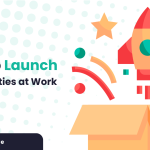.png)
Continuing with our Transform 2024 Thought Leader Interview Series, we sat down with Jennifer Oswald, otherwise known as the "Culture Jedi". With over 20 years of experience, Jennifer has earned a reputation for revolutionizing corporate cultures to address critical challenges and deliver exceptional outcomes.
In this interview, Jennifer shares her perspective on the biggest challenges facing organizations today, the rising importance of workplace communities, and the crucial role of belonging at work.
Jennifer, a champion of radical honesty and transparency in leadership, offers valuable strategies for cultivating psychologically safe workplaces, implementing effective listening practices, and nurturing a sense of belonging among employees. Her approach has made her a sought-after voice in the fields of organizational development and corporate strategy.
Join us as we explore Jennifer's thoughts on the future of work, organizational culture, and how leaders can adapt to create thriving, connected workplaces in an increasingly digital world.
Q: The workplace seems to be at an inflection point. The rise of AI and remote/hybrid work are fundamentally changing the ways in which we communicate and interact. In your opinion, what are the three biggest challenges facing organizations today in terms of fostering a positive culture and employee experience?
Jennifer: Creating a psychologically safe environment for your employees. Trust and feeling safe to express your ideas and thoughts in a workplace is invaluable. Those thoughts and ideas need to be greeted, not agreed with, safely so people experience sharing their ideas in a psychologically safe environment.
Understanding that every single person and every single leader impacts culture. Culture is not something that HR cultivates and owns, the entire company owns culture and expresses its culture in everything it does and doesn’t do. Create a culture strategy.
Have a listening strategy. A large part of communication is listening. If you’re not listening to your internal customers you’re missing out on a huge opportunity for continuous culture improvement.
Q: As a CPO, what has been your experience with communities in the workplace? Can you share your thoughts on why communities are receiving more and more attention within organizations?
Jennifer: Belonging is a basic need. Communities are a reflection of belonging. As we continue to transition to hybrid and remote workplaces, communities gain traction to help with belonging. Work and life are becoming more blended and (hopefully) more flexible. Communities support so many functions of human needs from DEI to special interest communities. Committees are a place to be seen and heard within an organization. I think you need to have a community strategy for establishing, leading, and maintaining communities, or they could quickly become extinct or appear to be lip service.
Q: Feeling connected to others and having a sense of belonging is often overlooked, yet it is vital for our overall well-being. From your perspective, why is fostering human connection and a sense of belonging so valuable in the workplace?
Jennifer: As I mentioned earlier, belonging is a basic human need. If you can foster belonging in your organization, you will have a more committed and productive workforce. What happens if people don’t feel like they belong? Slowly and surly they just start going through the motions versus really being committed to the mission and vision. People want to believe and belong in the workplace to fulfil their basic human needs.
We hope you enjoyed this interview. Interested in learning more about MixR? Click here

.png)





